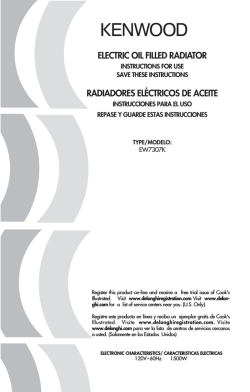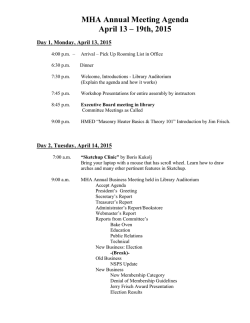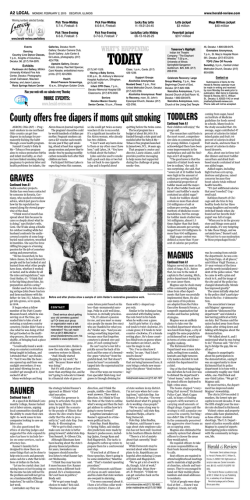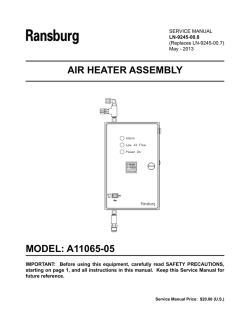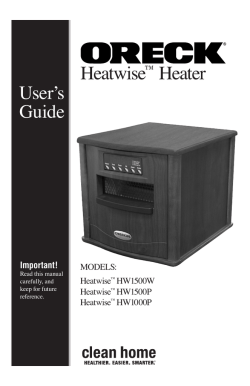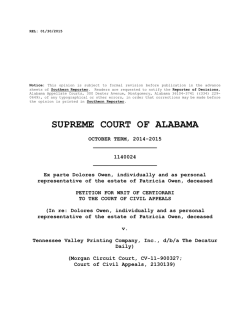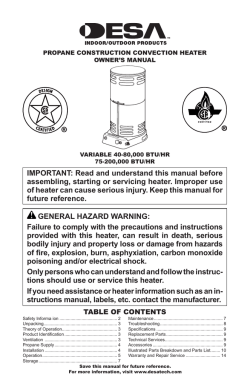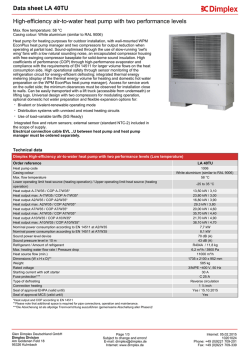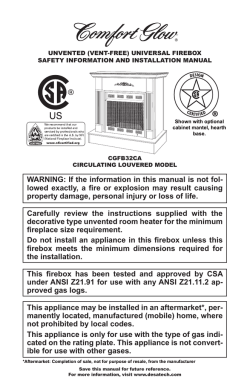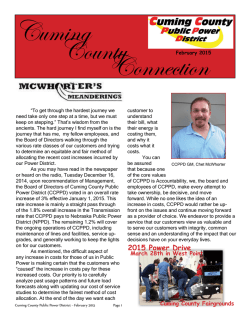
NEWS FROM YOUR COOPERATIVE
NEWS FROM YOUR COOPERATI www.dcremc.com CONTACT US LOCAL 812-663-3391 800-844-7362 TOLL FREE OFFICE HOURS 8 a.m.– 5 p.m., Monday-Friday STREET ADDRESS 1430 W. Main St. Greensburg, IN 47240 MAILING ADDRESS P.O. Box 46, Greensburg, IN 47240 EMERGENCY POWER OUTAGES To report a power outage, please call 663-3391 or 800-844-7362. During regular business hours, these phone numbers connect you with our office and after hours to our on-call service. When calling after hours, please limit your requests to outages and emergencies. Whenever you call, please give the name and account number of the service as shown on your bill. HOW TO REPORT AN OUTAGE 1. Check the fuses or breakers in your home. 2. Check the breakers below the meter if the meter is located on a yard pole. 3. Call your neighbors. If their power is also off, ask if they have reported it yet. Please do not take for granted that the outage has been reported. 4. Call Decatur County REMC to report your outage. Please be prepared to give the name, address, location number, and telephone number for the account without power in order for us process your call more quickly. TIP OF THE MON TH Take the hot out of washing Did you know that 90 percent of the energy used to operate a washing machine comes from using hot water? A simple switch from hot to cold can save a great deal of energy! Also, consider air drying or even line drying to save even more household energy. — U.S. DEPARTMENT OF ENERGY 4 Above and beyond Co-op membership offers value beyond electricity We are celebrating our 77th anniversary in 2015. We work hard every day to serve our 7,800 members. Offering our members real value — and working to improve the quality of life in the communities we serve — is just one DON way we set ourselves apart. SCHILLING Cooperatives are special and at Decatur County REMC, we believe that we have an obligation to provide reliable, affordable, and safe electricity. We don’t stop there. We take that a step further. We also have a responsibility to support our members, enrich our schools, and enhance our communities to the best of our abilities. So what exactly does real value mean? Well, in some ways it’s basic, like connecting with a real, local person when you call our office, rather than just a recording. It’s being greeted by a friendly, knowledgeable person when you make a visit to our local office. It could be keeping you informed about co-op business and goings-on in Indiana. Or it’s getting the lights back on more quickly after a major storm or after an unfortunate squirrel decided to warm himself on a transformer. After major weather events, thanks to mutual-aid agreements, we can bring line crews in from other co-ops to help us restore power to you as quickly and safely as possible. Every October, cooperatives are recognized for the qualities that make the business model unique: local democratic control, commitment to and supporting the communities they serve and improving quality of life, special benefits and services, and the return of margins (the co-op term for profits) back to members in the form of capital credits. The middle of February we will be sending capital credit checks to our members reflecting the patronage years of 1987, 1988 and 1990. If you were a member during that period of time, you will receive a check based on your usage. DON SCHILLING is general manager/president of Decatur County REMC. Statement of nondiscrimination Decatur County Rural Electric Corporation is the recipient of federal financial assistance from the Rural Utilities Service, an agency of the U.S. Department of Agriculture, and is subject to the provisions of Title VI of the Civil Rights Act of 1967, as amended; Section 504 of the Rehabilitation Act of 1973, as amended; the Age Discrimination Act of 1975, as amended; and the rules and regulations of the U.S. Department of Agriculture which provide that no person in the United States on the basis of race, color, national origin, age or handicap shall be excluded from participation in, admission or access to, be denied the benefits of, or otherwise be subjected to discrimination under any of this organization’s programs or activities. The person responsible for coordination this organization’s nondiscrimination compliance efforts is the manager of corporate relations. Any individual, or specific class of individuals, who feels that this organization has subjected them to discrimination may obtain further information about the statutes and regulations listed above and/or file a written complaint with this organization; or the Secretary, U.S. Dept. of Agriculture, Washington, D.C., 20250; or the Administrator, Rural Utilities Service, Washington, D.C., 20250. Complaints must be filed within 180 days after the alleged discrimination. Confidentiality will be maintained to the extent possible. ELECTRIC CONSUMER • FEBRUARY 2015 • ElectricConsumer.org IVE Decatur County REMC Annual Meeting REMC rate schedule January use / February bill Service availability ....................................$37 kWh rate .......................................$0.103670 Total kWh x power tracker ................. 0.010934 Total bill x sales tax............................ 0.07000 Example of bill for 1,200 kWh Service availability ....................................$37 1,200 kWh @ $0.103670..................... $124.40 1,200 kWh @ 0.010934..........................$13.12 TOTAL............................................... $174.52 State sales tax......................................$12.22 TOTAL BILL........................................$186.74 Decatur County REMC’s voting bylaw Section 3.05. — Voting Each member who is not in a status of suspension, as provided for in Section 2.01, shall be entitled to only one vote upon each matter submitted to a vote at any meeting of the members. A member shall have only one vote, although the member may have more than one meter. Voting by members other than members who are natural persons shall be allowed upon the presentation to the REMC, prior to or upon registration at each member meeting, of satisfactory evidence entitling that person to vote for the member. However, the individual who casts the vote of this member may not vote any other membership. An individual may cast only one vote. Members may not cumulate their votes or vote by proxy or mail. At all meetings of the members, all questions shall be decided by a majority of the members voting thereon, except as otherwise provided by the Articles of Incorporation or bylaws. A copy of our annual report is distributed to each member prior to our annual meeting. Be looking for it in the mail. ElectricConsumer.org • FEBRUARY 2015 • ELECTRIC CONSUMER 5 Decatur County REMC News Geared Up FOR SAFETY C an you imagine working a job that requires you to lift heavy equipment and perform detailed tasks near deadly high voltage? Now imagine doing this 40 feet in the air, and sometimes, in extreme weather. This is the life of a lineman. These brave men answer when called — and they do so to ensure that you are provided with safe, reliable electric service. But how do they stay safe when working in these conditions? Decatur County REMC linemen are required to wear personal protective equipment (PPE) at all times when on the job to keep them safe. Let’s take a look at a lineman’s PPE. Fire resistant (FR) clothing. While our linemen do everything possible to prevent them, unexpected fires can happen. Fires typically occur with an arc flash — an explosion that results from a low-impedance connection to a ground phase in an electrical system. FR clothing will self-extinguish, thus limiting injury due to burn. Insulated gloves. Linemen must wear insulated rubber gloves when working on any type of electrical line. These gloves provide protection against electrical shock and burn, and are tested at 30,000 volts. Protective gloves, usually made of leather, are worn over the insulated gloves to protect the rubber from punctures and cuts. Hard hat. No matter how tough or “hardheaded” our linemen are, they still need protection. Insulated hard hats are worn at all times to protect them from blows and falling objects. Steel toe boots. These heavy-duty boots are typically 16 inches tall and designed with extra support in mind. The height of the boot shields linemen from gouges, and serrated heels provide a better grip when climbing poles. The steel toe provides sturdier support and protects from objects that could potentially pierce the feet. . Safety goggles. Linemen must wear protective goggles or glasses, whether working on electrical lines or clearing rights-of-way. This protects them from loose debris and other hazards. These items make up a lineman’s basic PPE. While working on electrical lines, they also may be required to wear equipment belts, tool pouches, safety straps and other types of equipment. A lineman’s gear usually weighs about 50 pounds — that’s a lot of extra weight when working in hazardous conditions. So, the next time you see a lineman – be sure to thank him for keeping the lights on. But more importantly, thank them for the hard — and often times dangerous — work they do, day in and day out. … Calendars and almanacs are here! Stop by the Decatur County REMC office to pick up your free copy of the 2015 Farmers’ Almanac and the 2015 Cooperative Calendar of Student Art. The almanac is a source of information on many topics including weather and gardening, and the calendar, produced by Electric Consumer, features outstanding artwork by K-12 students from all over Indiana. Stop by our office today and pick up your copies. 28 ELECTRIC CONSUMER • FEBRUARY 2015 • ElectricConsumer.org Five tips for space heater safety A s temperatures drop this winter, many will look for supplemental heating sources for their homes. Space heaters can be a good alternative for those who want to warm one area of their home without turning up the thermostat on the central heating system. However, space heaters are also responsible for 32 percent of house fires, according to the National Fire Protection Association. If you are planning to use a space heater in your home this winter, review these tips from Decatur County REMC to keep you, your family and your property safe. Materials — What are the components of your space heater made of? Parts like metal grating can be hot to the touch and may burn anyone who gets too close. Make sure you purchase a heater that is cool to the touch and has guards over the coils just in case little fingers get too close. Placement — While it can be tempting to place a small heater on a shelf so it is not in the way of pets and children, it is safest to leave the heater on a level floor on a nonflammable surface. Keeping the space heater on the floor can keep it from falling over, preventing fire hazards. Also, remember that space heaters and bathrooms are not a good combination, unless the heater is designed for bathroom use. Moisture can damage the heater. The most important rule about space heater placement is the three-foot rule. Whether you are using the heater in the bedroom, living room or kitchen, space heaters should always be kept three feet away from flammable materials and out of the way of children and pets. Special Features — Does your space heater have an auto shutoff function if tipped over? Auto shutoff can be a lifesaver. If you currently own a space heater without auto shutoff, consider purchasing a heater with this important safety feature. Cords — You should never use an extension cord when plugging in a space heater as it can cause overheating. The space heater should be plugged directly into a wall outlet, and should be the only thing plugged in to the wall outlet. Also make sure cords aren’t in a high-traffic area so they are not a tripping hazard. Use — Never leave a heater unattended while in use. If you are leaving your home or going to bed, make sure to unplug the heater. Following these tips and making sure to follow the manufacturer’s instructions can keep you safe this winter. … Happy Valentine’s Day from Decatur County REMC! ElectricConsumer.org • FEBRUARY 2015 • ELECTRIC CONSUMER 29
© Copyright 2026
